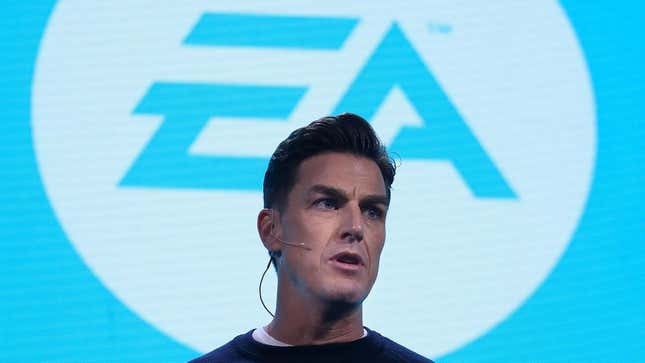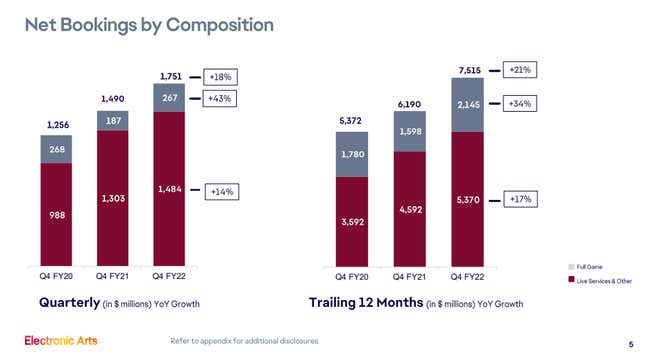
The CEO of Madden maker Electronic Arts is set to rake in $19.8 million in total compensation for his company’s strong performance in 2021. That’s about half of what it was for 2020 after EA’s Board of Directors cracked down on exorbitant bonuses in the face of shareholder backlash, but still several hundred times more than what some of EA’s lowest-paid employees make during this time of record inflation.
“For fiscal year 2022, the annual total compensation of our median employee was $115,569, and the annual total compensation of [CEO Andrew] Wilson, was $19,858,539,” EA notes in its latest SEC filing, first reported on by Axios. Most of that was from stock, with Wilson’s base salary sitting at $1,267,000. That’s a far cry from the roughly $39 million he earned in 2020 at the start of the pandemic. Following a non-binding shareholder vote to reign in executive pay that year, EA’s Board of Directors approved a much smaller pay package for 2021, calling the previous year’s windfall an “exception.”
But everything is relative, and in this case less money is still a lot, especially compared to what everyone else working at EA makes. Wilson’s 2021 earnings still makes him one of the top 10 highest-paid CEOs in gaming, and put him well above the median pay among S&P 500 CEOs last year ($14.5 million). It also means Wilson still makes 172 times as much money as the median EA employee’s total compensation ($115,569) and a whopping 636 times what some customer service staff laid off earlier this month were paid.

One of EA’s recently laid off customer service reps, who wished to remain anonymous because they did not want to be seen criticizing a former employer as they hunt for new work, told Kotaku they made only $15 an hour after their most recent annual raise of just $0.10. They and other staff, located at EA Austin, had complained about being forced to commute into the office while also dealing with the poor pay. An MIT study estimated a “living wage” for the Austin, Texas area to be $17.46 for someone living alone, but EA would rebuff requests for raises, saying it was already paying market rates.
“EA does not compensate for cost of living, we base our compensation ranges on market data for what similar roles are paid for in a geography and make adjustments as necessary,” one HR rep told Austin staff last November in the company Slack, based on screenshots shared with Kotaku. The company used a similar line when someone asked why EA’s rates still seemed to lag behind the median range for other technical support roles in the city, based on data provided by recruiting sites like Glassdoor. EA did not respond to a request for comment.
While quality assurance developers are one class of video game employee who’s been historically undervalued and underpaid, customer service and technical support are increasingly another as companies pivot to live-service games. Microtransactions in online multiplayer games like Apex Legends, FIFA, and Madden accounted for 85% of EA’s net bookings last quarter, and “advisors,” as they’re called internally, are on the frontline of helping players navigate errors, questions, and other issues related to those massive in-game economies. More of those jobs are now being shipped out to overseas vendors in cheaper labor markets like Romania and India.
“To outsource most of the support teams at EA to bank a higher profit isn’t okay,” the former employee told Kotaku. “At the end of the day the lower-level employees were the backbone of connecting to the players and getting their passion and vision for the games done. During the pandemic EA made a huge profit and still refused to increase pay based on cost of living.”
The numbers these days have gotten so big—Diablo Immortal raked in $24 million in its first two weeks and Microsoft is ponying up $69 billion to buy Activision Blizzard—that it’s easy to lose sight of just how big the gaps have gotten. In 1965 the ratio of CEO to median employee pay was just 20. The federal minimum wage at the time was $1.25. If it had kept up with some measures of inflation, the minimum wage would be $24 today. Even the QA workers on money presses like Call of Duty and Candy Crush, who recently won raises from Activision Blizzard, still don’t make that much. Andrew Wilson, meanwhile, got a $40,000 raise in his base pay alone this year.